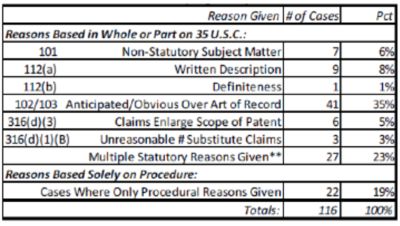
On Monday, May 9, 2016, the U.S. Patent and Trademark Office published information on Patent Trial and Appeal Board (PTAB) trials regarding motions to amend claims. The Acting Chief Administrative Patent Judge, Nathan Kelley, wrote that while the America Invents Act (AIA) gives patent owners the right to file a motion to amend its claims during a trial, few such motions have been granted as compared to the number of total petitions filed.
A motion to amend may involve a request to cancel patent claims, to substitute claims in the patent, or a combination of the two. Requests solely to cancel claims typically are granted without substantive review. Requests that seek to substitute claims are generally decided only when the panel of judges determines that the claims as originally issued are unpatentable, because nearly all such motions are contingent on a decision unfavorable to patentability of the original claims.
Judge Kelley noted that a Motion to Amend Study was conducted, and some highlights from the study (based on data current through April 30, 2016) include:
• There have been more than 4,850 inter partes review, covered business method review, and post-grant review petitions filed since the inception of the America Invents Act ("AIA"). Of these, 1539 trials have gone to completion or settled (where joined or consolidated trials were counted as a single trial), and motions to amend were sought in 192. (34 more motions to amend are pending in currently open cases.)
• Of those 192, not all ultimately required the PTAB to pass on the merits of the motion. This is because, often, motions to amend are filed as "contingent" motions -- if the PTAB upholds the patentability of the original claims, such motions never get decided. Several other cases settle before motions to amend are decided. Additionally, some motions to "amend" only request the cancellation of claims, and those are routinely granted.
Judge Kelley summarized that this leaves 118 motions to amend (out of the 192) that a PTAB panel has had a chance to review. Of these, the PTAB only granted or granted-in-part 6.
Of those denied, including the denial portion of those granted-in-part, 22 were denied solely on procedural grounds (only one of which was that the patent owner failed to state that the substitute claims were patentable over the prior art "in general"), and 94 were denied after identifying specific grounds of patentability that the proposed amended claims did not satisfy.
For the 94 denied, this refers to the proposed amended claims still being found unpatentable. This is akin to an examiner rejecting an amended claim because it is anticipated, obvious, not described, etc. But, the PTAB proceedings must be completed within a year, and there is no time for the back-and-forth between the applicant and the USPTO that happens during prosecution. Instead, the PTAB acts as the final arbiter of these newly proposed claims based solely on the briefing presented to it by the parties -- if the PTAB grants such a motion, the new claims will issue (and be enforceable against the public) without any examination to ensure compliance with the statutory requirements for patentability. A disappointed patent owner who believes the PTAB erred in refusing to allow a claim amendment can, of course, seek review from the Federal Circuit.
Below is a table from the study that summarizes reasons provided for denying entry of substitute claims.

As seen from the table, it appears that patent owners have not been able to satisfy the Board that any such proposed amendments would in fact distinguish over the art used to challenge the patent. Patent owners, of course, have to consider an infringer when proposing amendments to the claims, and it would seem that most proposed amendments likely do not vary enough in scope over issued claims so as to overcome the challenging art.
Judge Kelley discounted the notion that motions to amend are no longer being filed because parties think they're futile, and noted that the PTAB is currently on track to have about 50 motions filed this year, which is consistent with the level they were filed in 2013 (e.g., 49 filed) and 2015 (e.g., 59 filed). Although there were 92 motions to amend filed in 2014, and so these motions are on the decline based on a few years of data.